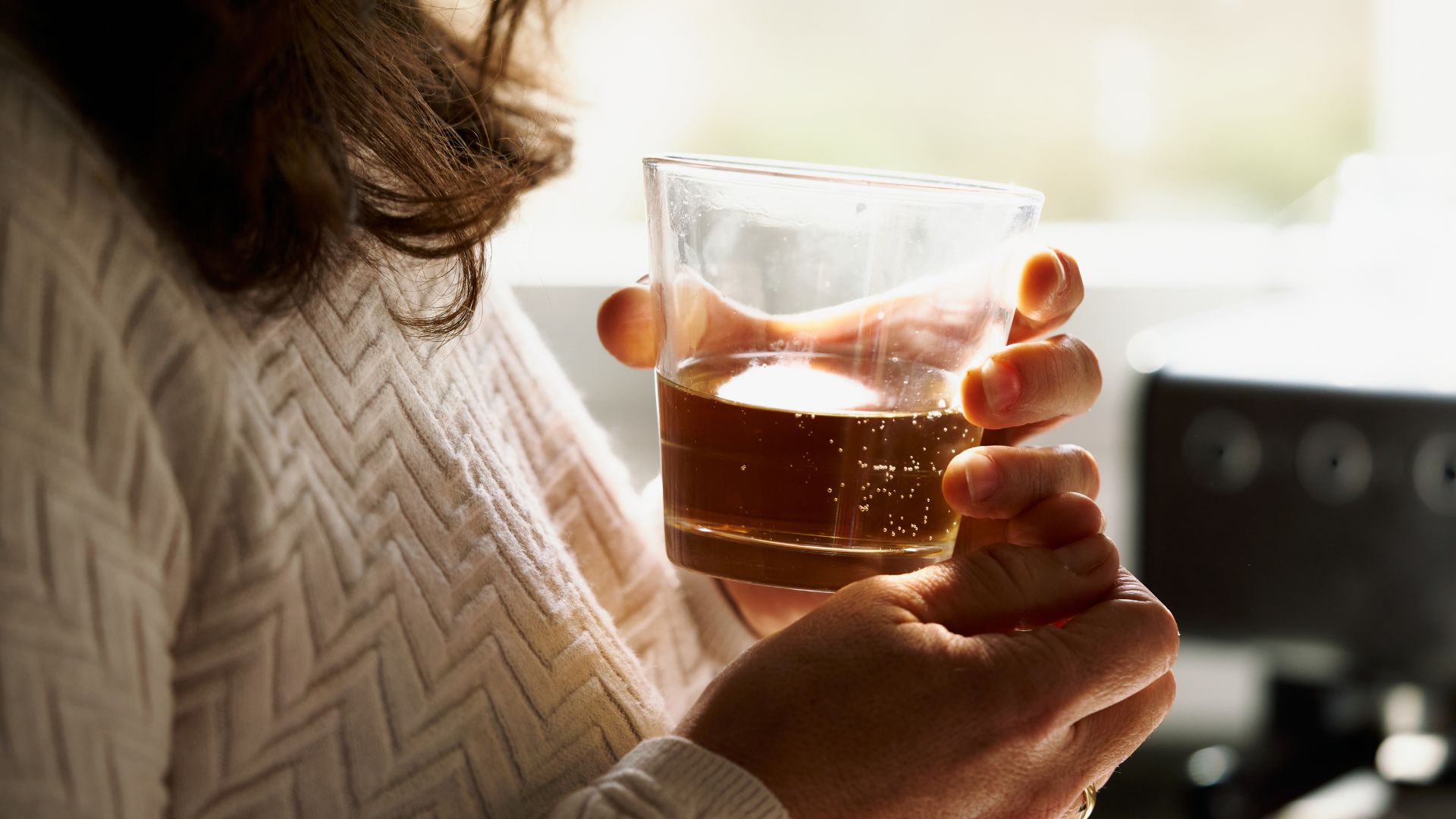
About 75% of women experience hot flushes, making them one of the most common symptoms of menopause. But if you've not even hit perimenopause yet or you're already postmenopausal, it's still possible to experience a hot flash, as there are other causes.
However, in all cases, visit your doctor before you do anything else. There are some simple explanations for a hot flush (for some, all it takes is alcohol or eating spicy food), but some are more serious and may need urgent intervention.
In the meantime, we've spoken to pharmacists and doctors to reveal the causes of hot flushes apart from menopause, why they happen, and the possible treatment options.
What are hot flushes?
A hot flash is a sudden, intense feeling of warmth focused around the face, neck, and chest. While they can look a little different for everyone, skin typically reddens, and you might start to sweat.
They're one of the most common menopause symptoms as well. "Around 85% of menopausal women experience hot flushes and night sweats, according to a study in association with Lahore College Women University, which can be extremely unpleasant," says Dr Deborah Lee, a women's health specialist from Dr Fox Online Pharmacy.
Some women will only get a few mild hot spells, she explains, whereas anyone severely affected by hot flashes could have 50 or more episodes per day. "When severe, the woman often feels dizzy, faint, and unwell, and cannot catch her breath. Hot flashes can occur very close together, making someone feel exhausted a debilitated."
Hot flashes can also occur at night and are often referred to as night sweats in this case. "When they occur at night, people often wake up from sleep, soaking the sheets and nightclothes, such that these need changing," Dr Lee says. "If sleep is persistently disrupted, this leads to insomnia, fatigue, and complete exhaustion."
If these symptoms all sound a little too familiar and you're not perimenopausal or you're postmenopausal, there are other reasons for hot flashes.
What causes hot flushes apart from menopause?
1. Anxiety disorders and panic attacks
Outside of having anxiety in menopause, feeling very anxious or having a panic attack can cause a hot flush. "Moderate-severe anxiety symptoms increase the risk of hot flushes between three and five times, respectively," explains Dr Lee.
"This is down to the overactivation of the sympathetic nervous system, which leads to a surge in the output of adrenaline and makes you feel hot and sweaty with a racing heart," he says.
To quell anxiety in the first place and lower your cortisol levels, start taking deep and slow breaths if you can. Try to move to a cooler space, sip a cold drink, and dab your skin with a cool cloth.
2. Hyperthyroidism
The thyroid is a butterfly-shaped gland in the neck that produces hormones responsible for regulating bodily processes, such as our heart rate and body temperature. Having an excess of the hormone thyroxine is referred to as hyperthyroidism, and it can cause the body to overheat. It also increases heat intolerance, says Dr Lee.
It's definitely worth considering this as one of the causes of hot flashes apart from menopause. According to the NHS, women are 10 times more prone than men to have them, particularly those between 20 and 40 years of age, but very few people know the symptoms of the condition.
Watch out for other signs of hyperthyroidism and see your doctor, says Hussain Abdeh, the clinical director and superintendent pharmacist at Medicine Direct. "This problem may be the issue if your hot flushes are accompanied by symptoms like fatigue, changes in your body temperature, and muscle and joint pain," he says.
3. Prescription medication
Various prescription medications are a common cause of hot flushes apart from menopause. "For example, opiates, nitrates, SSRIs, calcium channel blockers, GnRH antagonists, levodopa, antioestrogen, and selective estrogen receptor modulators (SERMs) can all lead to hot flushes," recalls Dr Lee.
It's to do with how they react within the body. "Opiates cause flushing as they activate histamine receptors. Nitrates cause facial flushing with increased blood flow to the facial skin, and calcium channel blockers cause smooth muscle relaxation and vasodilation, resulting in lower blood pressure and flushing," she explains.
Hot flushes are a more common side effect of taking SERMs, which are used to treat and prevent some types of breast cancer and to treat and prevent osteoporosis. "Hot flushes occur for some reason because when the drug attaches to the estrogen receptor, the estrogen receptor has been modified."
4. Dumping syndrome
If you've recently undergone any kind of gastric surgery and are experiencing hot flashes, dumping syndrome could be the cause. This is a condition where food moves too quickly from the stomach to the duodenum, a part of the small intestine. It causes glucose levels to drop.
According to research from OBH-Interfaith Medical Center, the condition affects between 20 to 50% of people who undergo the procedure.
"A sudden drop in blood glucose levels can occur after gastrointestinal surgery," says Dr Lee. "And low blood glucose causes sweating and feeling unwell."
Other causes of dumping syndrome include diabetes, viral illnesses, and idiopathic causes, the research says. But whatever the trigger, while dumping syndrome can be uncomfortable, it's often treated with dietary changes. Meals should be small and eaten more frequently, and liquids shouldn't be consumed at all in the 30 minutes following a meal.
"Additionally, simple sugars and milk products should be avoided, and protein and fat calories should be increased to compensate for a decreased carbohydrate intake," the study's lead concluded.
5. Spicy food
Bad news for lovers of curries, chilis, and hot peppers. Spicy food can, unfortunately, cause a rapid heat rise that feels like a hot flush.
It's all down to a natural compound in spicy food called capsaicin. This compound stimulates the same receptors in our nerves that detect when something is too hot. The brain gets this signal and thinks the body is overheating, activating our natural cooling system, which means dilating the blood vessels, lowering our body temperature by sweating, and increasing blood flow to the surface of the skin, causing a flush.
The easiest way to cool down after eating spicy food is to eat dairy products, if you're able to. Milk, yoghurt, or ice cream is best. The dairy binds with the capsaicin to move it through the digestive system quickly.
6. Alcohol
When we drink, our blood vessels dilate for a couple of reasons: alcohol is toxic, and drinking alcohol causes a release of nitric oxide, which causes the vessels to widen. Wider vessels mean our blood is closer the the skin, giving that 'flushed' appearance.
Not everyone gets this reaction, however. It's all linked to how quickly your body metabolises alcohol, genetics, and whether there are other factors involved, too, like menopause. The combination of alcohol and menopause is a sure-fire cause of hot flushes.
If this happens almost immediately after drinking, it could be your cause of hot flushes apart from menopause. Make sure you stay hydrated by drinking plenty of water and swapping your drinks for alcohol alternatives.

7. Pheochromocytoma tumor
On a more serious note, although rare, a pheochromocytoma tumour could be responsible for hot flushes, Dr Lee explains. "It's an adrenal tumour that secretes adrenaline and causes high blood pressure. High adrenaline levels cause increased heat production and result in excessive sweating."
It's because of the adrenaline surge that we might also experience a hot flush during particularly stressful periods, too, which is why it's important to recognise the signs of high cortisol levels and reduce stress.
8. Carcinoid syndrome
Carcinoid syndrome is a set of symptoms that some women develop when they are dealing with a neuroendocrine tumour, one that typically grows in the bowels or appendix, but it can also be found in the stomach, pancreas, lung, breast, kidney, or ovaries.
This type of tumour, Dr Lee says, "can affect a variety of organs and it secretes excess serotonin, which causes the skin to flush, blood vessels to dilate, and the skin loses heat."
While they tend to grow slowly, if you are experiencing any of the other symptoms linked with this type of tumour - including stomach pain, rectal bleeding, tiredness, weakness, and/or unexpected weight loss - then it's vital to see a doctor. According to a study by The University of Texas MD Anderson Cancer Centre, this syndrome is most commonly found in those with stage one or two cancer, and it's more often associated with women than men.
However, this is a very rare condition. According to The National Organisation for Rare Disorders, 3 to 4.3 per 100,000 people have a carcinoid tumour. Of these, 0.27 per 100,000 are diagnosed with carcinoid tumours.
How to stop hot flushes
The best way to stop hot flushes for good is to identify the underlying cause of them, Dr Lee says. "You can then treat the cause and avoid any known triggers."
Most people have hot flushes during menopause, and one of the most common ways to treat this is with hormone replacement therapy (HRT). However, this isn't going to work if hormonal changes are not causing the hot flush.
Here are some other ways to deal with it:
- Try to keep cool: "Wear loose-fitting cotton garments, and avoid the midday sun," she says.
- Optimise your environment: Use a fan or an air conditioner, sleep with the windows open, and try one of the best cooling pillows.
- Find the best way to reduce stress where possible: "Take up yoga for beginners, meditation, or Tai Chi," she suggests. "Practise breathing exercises twice a day and make sure to exercise regularly."
- Avoid other triggers: Caffeine, alcohol, sugar, and spicy food can all make other hot flush triggers worse.
- Weight loss: A University of California study suggests that menopausal women who are overweight or obese have fewer hot flashes after they lose weight.
- Cognitive behavioural therapy (CBT): "It's been found to be highly effective in helping to reduce hot flushes," she says.
- Get some fresh air: "Remind yourself this is natural and that it will pass. The more anxious you get, the worse it will be," Dr Lee advises.







